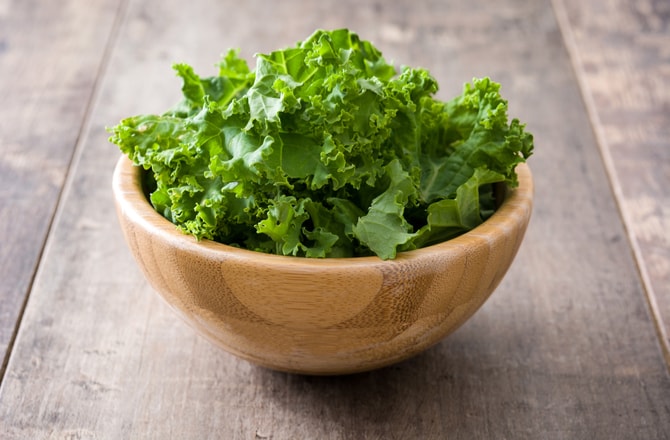Not all foods are created equal. Those that are nutrient-packed and antioxidant-rich have been deemed “superfoods,” an elite, headline-grabbing category of ingredients that are thought to provide extra-special health benefits.
You’ve probably dabbled in acai berries and know a thing or two about kale, but what about your pup? Can superfoods boost his health, too? According to the experts, some of the same fruits and veggies in your health magazines can be beneficial to canines, as well. Read on for their top picks. But as always, check with your veterinarian before changing your pet’s diet—every dog’s needs are unique.
Salmon

Packed with omega-3 fatty acids, salmon is great for you and great for your BFF. These healthy fats boost the immune system while nourishing hair and skin.
“I include salmon or other oily fish in the recipes I formulate and recommend that people include them as the protein in homemade diets on a rotating basis with other meats,” says Dr. Susan G. Wynn, author and veterinary nutritionist. If you’re already supplementing your dog’s diet with fish oil, however, she cautions that it’s important to monitor how much fish you feed your pup—it’s possible to overdose on fatty acids.
Kale

Everyone knows that kale, the trendiest of greens, is good for you. But did you know that it’s good for your dog, too? Loaded with vitamins and minerals, it’s a great way to reap the benefits of leafy greens while supporting liver and cardiovascular health.
Although it has similar benefits, spinach isn’t as safe. “Spinach is higher in oxalates, which can be problematic for pets that may be prone to stones in the kidney and bladder,” cautions Dr. Judy Morgan, an author and veterinarian certified in food therapy. “This is a bigger problem in small breeds, particularly terriers and Schnauzers.”
Blueberries

Full of fiber and antioxidants, blueberries are a healthy addition to most dogs’ diets. Wynn recommends using them as a dog treat, as a blueberry is actually the correct treat serving size—which may be a shock to some pet parents. “A ‘treat’ is small, and a ‘snack’ is significantly larger—most owners don’t know the difference,” she cautions.
Pears

While not a commonly ranked among the “superfoods,” pears are, in fact, a super treat for your dog, says Morgan. High in fiber, low in calories, and yummy in taste, pear slices are a great substitute for store-bought treats.
Purple Cabbage

We all know to eat our greens, but what about our purples? Vibrant colors usually signify vibrant nutrients, which is definitely true for antioxidant-rich purple cabbage. “Greens are healthy, but so are veggies of other colors, especially in the yellow-red-purple range,” says Wynn. “I recommend that people use the rainbow.” For yellow she suggests yellow squash, while bell peppers are recommended reds.
Eggs

Perhaps the original “superfood,” eggs are positively packed with the good stuff. “They’re the perfect protein,” says Morgan. She recommends incorporating them into your pup’s diet to promote healthy digestion, build strong bones, and provide a convenient dose of vitamins A, D, E and K.
Pumpkin

If your dog is having problems with, ahem, regularity, pumpkin may be the answer. In fact, Morgan counts it among her key ingredients in a homemade diet. “It’s great for digestion,” she says. “The soluble and insoluble fibers feed the gut good bacteria.” If you’re buying canned, make sure to carefully read the label—you want pure pumpkin puree, not the sugar-filled pie filling!
Apples

Apple slices not only help clean your pup’s teeth, but they’re full of important nutrients, as well. Wynn recommends them for the soluble fiber and antioxidants—just don’t forget to take out the seeds! Apple seeds are a potential choking hazard and contain a toxic cyanide compound.
Turmeric & Ginger

While you shouldn’t salt your dog’s food, sometimes a little seasoning is in order. Long revered for their health benefits in human diets, turmeric and ginger are good for your dog, as well. “They’re both anti-inflammatory, and can soothe digestion and fight cancer,” says Morgan.
Coconut Oil

iStock.com/Lisovskaya
This superfood darling seems to be everywhere these days—and now, you can add your dog’s bowl to the list, says Morgan. When added to dog food, it’s been known to improve skin and coats, aid in digestion, and soothe allergic reactions. Be sure to consult with your veterinarian about dosages—coconut oil is high in calories and too much could raise cholesterol levels.
Want to add more superfoods to your pet’s diet? Check out Chewy’s picks below:
Monica Weymouth is a writer, editor and certified Weird Animal Lady. She lives in Philadelphia with her two rescued Shih Tzus.
Share:









